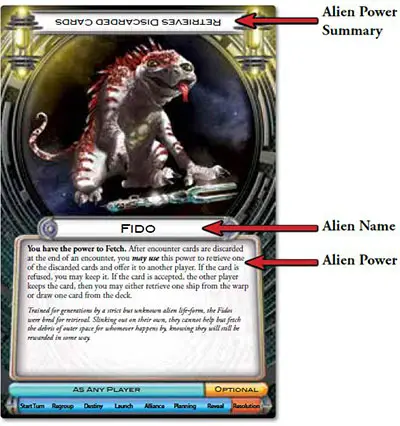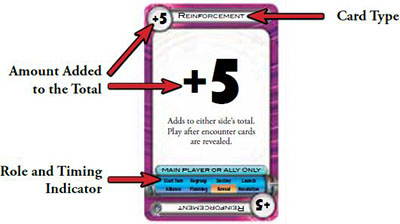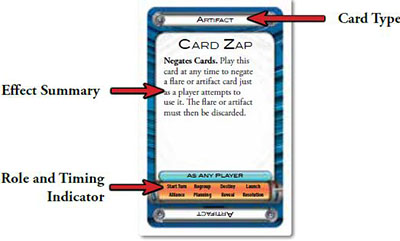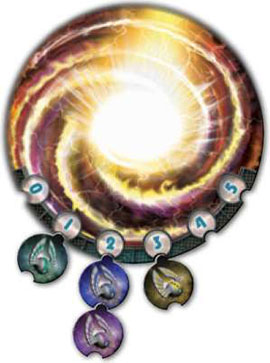
This section contains additional rules that players must understand to play Cosmic Encounter.
Alien Sheets
Each player has an alien sheet, which represents the alien species they are playing as. Each alien sheet includes the name of the alien and its unique power. The top of each alien sheet features upside-down text that provides a one-line summary of that alien's power for other players to read.

The bottom of each alien sheet indicates the prerequisites for using that alien's power. The upper blue bar indicates which role the player must have to use that aliens power (e. g., main player, defensive ally, etc)..

A player can use this alien power if they are the offense or defense. They cannot use this power if they are an ally or not participating in the encounter.
The orange bar indicates if the power is mandatory or optional. If an alien power is mandatory, the player must use that alien's power when they are able to. If an alien's power is optional, the player can choose whether or not to use that alien's power when they are able to.

A Player must use this alien power when they are able to do so.

A player can choose whether or not to use this alien power when they are able to do so.
The phase bar (lower blue bar) reminds players when the alien's power can be used. One or more of the phases in this bar are highlighted in orange; the alien's power can be used during these phases.

A player can use this alien power during the Planning Phase.
Alert Lamps
Each alien sheet has a green-, yellow-, or red-colored alert lamp that indicates the complexity of each alien's power. Green represents less complex aliens, yellow represents aliens with medium complexity, and red represents more complex aliens.
The complexity of an alien's power does not correlate to its strength; aliens with green alert lamps can be as powerful as aliens with red alert lamps.
 Green, Yellow, and Red Alert Lamps |
Reinforcement Cards
Reinforcement cards offer a sneaky way for players to increase either side's total during an encounter.
After the main players reveal their encounter cards, each player participating in the encounter can play reinforcement cards, choosing to benefit either the offense or the defense. Each reinforcement card's value is added to the chosen player's total.

After an encounter is resolved, reinforcement cards are discarded along with the encounter cards that are revealed.
Artifact Cards
Artifact cards provide players with powerful, single-use effects. When played, they produce the effect described on the card. Like alien sheets, these cards contain bars to indicate the requirements for playing the card.
After an artifact is played, it is discarded.

Zapping Powers
Players can use the "Cosmic Zap" artifact card to cancel one use of an alien's power. That power cannot be used again for the rest of the encounter. Some alien powers (or some parts of aliens' powers) do not require the power to be used. Powers such as these that function without being used cannot be the target of the "Cosmic Zap".
For example, the Warrior's power can be zapped when used to add to the Warrior's total during an encounter, but it cannot be zapped when adding tokens to its alien sheet.
Similarly, the Zombie's power can be zapped when used to save its own ships from going to the warp, but it cannot be zapped to stop the Zombie from freeing other players' ships as part of a deal.
Losing Home Planets and Alien Powers
When a player removes their last ship from one of their home planets, that planet is lost. Players cannot return ships to their lost planets. Players defend their lost planets as normal but will not have ships to add to their total. Players can re-establish colonies on their lost planets.
If a player ever has fewer than three home colonies, that player loses their alien power. When this happens, that player flips their alien sheet facedown to indicate that their alien's power is lost, and that player cannot use any part of the power on their alien sheet.
If a player who lost their alien power ever has three or more home colonies again, they immediately regain their alien power, flipping their alien sheet faceup.
The Colony Track
The colony track always reflects the number of foreign colonies that each player has. If a player gains or loses a foreign colony, they increase or decrease their colony marker on the colony track accordingly so that the number their colony marker is aligned with equals the number of foreign colonies they currently have.
When a player establishes their fifth foreign colony, they immediately win the game. If multiple people establish their fifth foreign colony at the same time, all players who have five foreign colonies win the game together.
 The colony track reflects the number of foreign colonies each player has. |
No Encounter Cards in Hand
When a player has no encounter cards remaining in their hand at certain times during the game, they must follow a special rule as follows:
During the Start Turn Phase, if the offense has no encounter cards, they must discard their hand and create a new hand by drawing eight cards. They repeat this process until they have at least one encounter card.
After a successful first encounter, if the offense has no encounter cards, they cannot have a second encounter that turn.
During an encounter, at any time before cards are selected during the Planning Phase, if the offense has no encounter cards (due to an alien power or other game effect), their turn ends immediately. Any committed ships are returned to their players' colonies.
When the defense must play an encounter card and has no encounter cards in hand, they may play any cards in hand that can be played during the current phase as the defense. Then, they must discard their hand and draw eight new cards. This process is repeated until the defense has at least one encounter card.
Bystanders
Foreign colonies on a planet where an encounter is occurring are bystanders. Ships that are part of a bystander colony do not contribute to encounters and are not affected by the outcome of an encounter.
When committing ships, an ally can take any ships, including bystanders, from any of their home or foreign colonies.
 The purple player is attacking the green player. The yellow player's colony is a bystander |
Continue Reading


